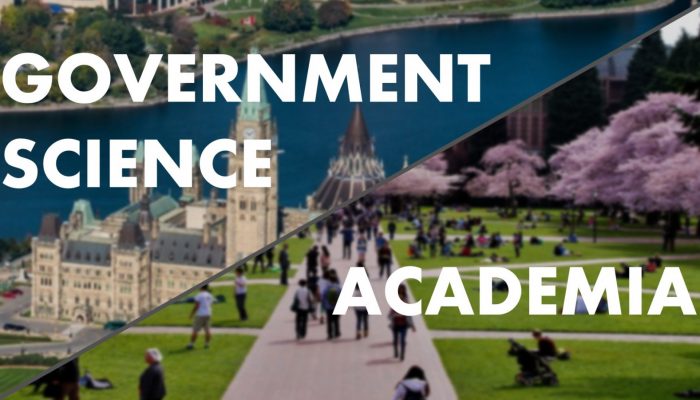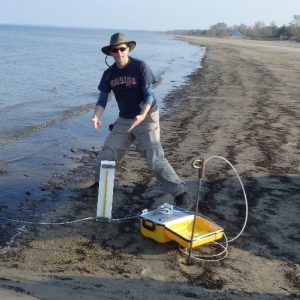
Post by Jim Roy, Research Scientist at Environment and Climate Change Canada.
_______________________________________________
A recent editorial in Nature highlighted the relative scarcity of academic positions available to graduating PhD students (Many junior scientists need to take a hard look at their job prospects; 25 October, 2017). It notes that “it has been evident for years that international science is training many more PhD students than the academic system can support”. Firm figures aren’t available, but the article suggests maybe < 5 % will land a full-time academic job. That number may be somewhat higher for Groundwater-related disciplines, but the point remains that many should “make plans for a life outside academic science.”
However, it’s not all doom and gloom; indeed the article goes on to state that “it is good for PhD students and postdocs to pursue careers outside academia. Many will find similar challenges and rewards in industry.” There are a lot of options for Groundwater PhDs in industry and the plethora of supporting consulting firms: in mining, oil and gas, tunnel and dam engineering, municipal water supply, and contaminated site remediation, to list a few. However, there is an additional career path to consider, especially if you want to continue doing research – the government scientist, like me.
According to Wikipedea: A government scientist is a “scientist employed by a country’s government, either in a research-driven job (for example J. Robert Oppenheimer on the Manhattan Project), or for another role that requires scientific training and methods.” I’ll be focusing on those that do research (encompassing science and engineering), at least for much of their work. And in this blog, I’ll be comparing their job duties and conditions to that of the professor, the research job with which the majority of students and post-docs are most familiar and traditionally aiming for. It’s what I thought I would be too, coming out of grad school. Now it’s been 10 years since I took up my position as a Research Scientist focusing on groundwater contamination/quality with Environment Canada (now Environment and Climate Change Canada) – enough time to have experienced the ups and downs of the Canadian economy and the changing of the governing party, with repercussions of both for federal science priorities and budgets. The discussion below is based largely on my own experience, with insight gleaned from talking with colleagues in other government agenciesa over the years. It’s also highly generalized; the exact situations will vary by country, agency, and even by individual scientist, and may change over time. But hopefully it’s good enough for a light-hearted introduction to this alternate career area.
So here goes – my Top 10 list of how a government scientist job is different than academia:
- Freedom
All scientists want to do work that is meaningful, but not all scientists get to choose on what topic that work will focus. In general, government scientists undertake research on issues of government priority that will advise on federal policy, regulations, and management activities, or that will provide service to important national industries or the public. So their work should have a meaningful impact on their country, if not more broadly; they just don’t get to decide on the priority topics (with exceptions for certain agencies or programs). However, often these priority topics are general enough that there is some range of projects that can fit within them, giving the scientist some flexibility on their research focus. Also, by advising their management and government representatives of important topics, government scientists may influence the direction of government priorities. Also, a government scientist may be afforded some leeway to work on additional topics outside these priority areas with a small fraction of their time. Government research usually targets short- to intermediate-term achievements, as fits the common government election cycle. However, some priority topics may last for decades – see North American Great Lakes eutrophication and algal blooms – waxing and waning in importance with the severity of the problem (costs!) in relation to the other pressures on the government (the economy!). For those who choose this career path – beware, though, when government priorities change, your research area may have to change too.
For academics, their options are typically much broader, encompassing everything between applied research with immediate implications to research so basic that nobody can predict what may eventually come of it. The caveat to this is that an academic’s research topic often has to be deemed important enough and applied enough for “someone” to fund it. Industry funding is usually quite applied. But even government funding agencies, which are usually the primary support for more basic academic research, are increasingly imposing greater direction over the acceptable topics of proposed research. So perhaps this extra freedom isn’t so vast in practice.
- Trading places?
Many government scientists are appointed to one or more adjunct professor positions at universities where their academic collaborators reside. These could be at nearby universities or those across the globe, and these locations may change over a career. It isn’t a paid position, but allows for closer research ties, including the (co-)supervision of undergraduate and graduate students, which benefits both the university and the government agency. Such positions may also afford access to laboratory space on campus or to additional research funding (held at the university, but directed by the adjunct professor).
I haven’t heard of a case of the opposite arrangement – adjunct government scientist – but it might exist. Academics may pop in and be given some office space and support during a sabbatical while collaborating with a government scientist, but they’re really just temporary squatters. If anyone out there knows of such a situation, feel free to post below.
- No teaching ( 🙂 or 🙁 )
An obvious difference, this can be viewed as good or bad news depending on how much you like it. I enjoyed teaching while I was a grad student. Many scientists give guest lectures or even short-courses at local universities. I taught an entire hydrogeology course for a university colleague during his sabbatical – so this can be an option for some in government who have an interest. Not having required teaching does provide greater flexibility in scheduling your work (especially field trips) and leaves more time for research and/or other important activities, like playing hockey or “family life”.
- Professors have grad students; government scientists have technicians
The model for academic research is based on students and post-docs (a team of them often) carrying out the primary duties of research under the supervision of their professor. Certainly there are exceptions where the professor carries out their own study, but generally they lack the time for this. However, professors may have technicians too. It’s common for some to hire current or past students as technicians for a few years after they graduate, while (senior) professors may have dedicated technicians.
In contrast, the model for government scientists is to have one or more dedicated and highly-experienced technicians available to assist in their research. Separate analytical laboratory or field teams may also be available. Although, with tightening budgets this technical support seems to be dwindling. It’s also fairly common for post-doctoral fellows to be hired by government agencies to work with their scientists – I’ve worked closely with 2 post-docs over my 10 years at Environment and Climate Change Canada. And what’s more, through adjunct professor positions or just collaborations, government scientists may also work with and (co-)supervise students from a partner university, just not to the same extent as for the academics.
Thus, there can be a fair bit of overlap between these two models, especially when collaborations extend between academics and government researchers; and this integration, I think, makes for better science all around.
- Both are sought out by regulators and policy-makers
Government scientists might have the inside track to the ear of policy-makers, but advice from academics is often gathered via workshops and contracts for reviews and reports as well. Sadly, in large departments especially, some bureaucrats may not realize they have internal expertise in an area like hydrogeology. Which leads us to the next point…
- Governments typically do a poorer job of selling/showcasing their scientists
Academics have much more freedom to showcase themselves and their work to the public, the science community, and business/industry. This can be through personalized research web pages, starting a blog (like this one!), and greater freedom to speak to the media (depending on the presiding-government’s rules for their scientists). They also tend to attend more scientific conferences, where they and their students can advertise their scientific wares to a range of audiences.
- No consulting on the side
Not all professors consult, but many do, which can provide a boost in income and lead to funding or in-kind support opportunities for their research or to job opportunities for their students. I haven’t heard of any government agencies that allow their scientists to consult as a side profession. In part, they want all your time devoted to your job working for them; but it also runs into “conflict-of-interest” concerns. Now that doesn’t mean you can’t have a side-job (e.g., selling pottery, repairing dishwashers, stand-up comedy, teaching Yoga), but it can’t relate to your science profession.
- Border-crossing restrictions
Working on national (or state/provincial) priority research commonly means government scientists work predominantly on sites in their own country (region), unless inter-jurisdictional agreements are made to combine or share research expertise. In contrast, academics are able and encouraged to work at international sites, which can expand the range of research topics and potentially funding sources available to them.
- Less competition for funding (except when the coffers are bare)
Much of my funding is internal, requiring much shorter (i.e., less onerous) proposals than is typical for my academic colleagues seeking funding through centralized national funding agencies (e.g., NSERC in Canada) or from industry partners. My proposals may still go through a competitive process, though, sometimes with external reviews. How substantive this internal funding is compared to academic funding will depend on the agency, how science is viewed by the current government, the state of the economy, and the importance of the topic. When internal research budgets are tight, there may not be sufficient funding to go around, especially for those not working directly on key priorities. Of note, some government agencies allow their scientists who have adjunct status at a university to apply for the same set of grants as academics. Whether such proposals are frowned upon or judged differently by funding agencies is up for debate.
- Joy in their work
Frustrations with too-much time devoted to administrative tasks and seeking funding are prevalent in both government and academic research areas. But still, the opportunity to do research on interesting, challenging, and important topics at the edge of our current scientific understanding brings enjoyment / fulfillment to both government scientists and academics. We all feel that slight quickening of the pulse when “the data is in” and we learn if the expected outcomes were realized or (better yet) something different (new!) might be going on. It’s why we do what we do. In hydrogeology, there remains much to explore, especially at the inter-disciplinary mixing zones around the edges of our specialty. And we’ll need new concepts, new methods, and new connections to move our understanding forward. Scientists from academia and government and industry and other groups can all contribute to this quest. For graduating PhDs, hopefully this leaves you with multiple career path options for joining in the fun.
a In Canada, besides Environment and Climate Change Canada there are also PhD-holders doing groundwater-related research in Natural Resources Canada, Agriculture and Agri-Food Canada, and the National Research Council. In the U.S., much great groundwater research is carried out by the U.S. Geological Survey, with research also carried out by other federal and state agencies. Many other countries have similar geological or environmental departments or agencies with PhDs doing some or much research. You can look these up on the web, though often government scientist pages aren’t nearly as good as those for academia.
_______________________________________________
 Jim Roy is a Research Scientist at Environment and Climate Change Canada. His current research focuses on: groundwater contaminant impacts on surface waters and aquatic ecosystems, groundwater contributions of phosphorus to surface waters, potential leakage of Alberta oil sands tailings ponds to the Athabasca River, and groundwater and gas systems. Find out more about Jim by clicking on the links below.
Jim Roy is a Research Scientist at Environment and Climate Change Canada. His current research focuses on: groundwater contaminant impacts on surface waters and aquatic ecosystems, groundwater contributions of phosphorus to surface waters, potential leakage of Alberta oil sands tailings ponds to the Athabasca River, and groundwater and gas systems. Find out more about Jim by clicking on the links below.



